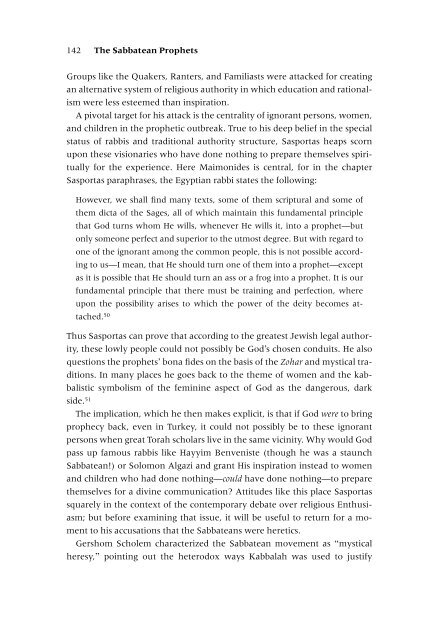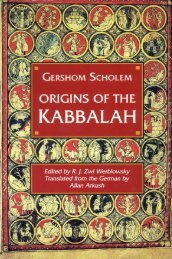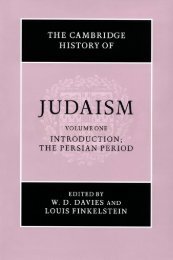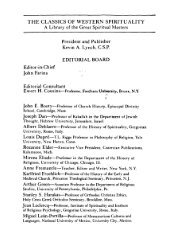You also want an ePaper? Increase the reach of your titles
YUMPU automatically turns print PDFs into web optimized ePapers that Google loves.
142 <strong>The</strong> <strong>Sabbatean</strong> <strong>Prophets</strong><br />
Groups like the Quakers, Ranters, and Familiasts were attacked for creating<br />
an alternative system of religious authority in which education and rationalism<br />
were less esteemed than inspiration.<br />
A pivotal target for his attack is the centrality of ignorant persons, women,<br />
and children in the prophetic outbreak. True to his deep belief in the special<br />
status of rabbis and traditional authority structure, Sasportas heaps scorn<br />
upon these visionaries who have done nothing to prepare themselves spiritually<br />
for the experience. Here Maimonides is central, for in the chapter<br />
Sasportas paraphrases, the Egyptian rabbi states the following:<br />
However, we shall find many texts, some of them scriptural and some of<br />
them dicta of the Sages, all of which maintain this fundamental principle<br />
that God turns whom He wills, whenever He wills it, into a prophet—but<br />
only someone perfect and superior to the utmost degree. But with regard to<br />
one of the ignorant among the common people, this is not possible according<br />
to us—I mean, that He should turn one of them into a prophet—except<br />
as it is possible that He should turn an ass or a frog into a prophet. It is our<br />
fundamental principle that there must be training and perfection, where<br />
upon the possibility arises to which the power of the deity becomes attached.<br />
50<br />
Thus Sasportas can prove that according to the greatest Jewish legal authority,<br />
these lowly people could not possibly be God’s chosen conduits. He also<br />
questions the prophets’ bona fides on the basis of the Zohar and mystical traditions.<br />
In many places he goes back to the theme of women and the kabbalistic<br />
symbolism of the feminine aspect of God as the dangerous, dark<br />
side. 51<br />
<strong>The</strong> implication, which he then makes explicit, is that if God were to bring<br />
prophecy back, even in Turkey, it could not possibly be to these ignorant<br />
persons when great Torah scholars live in the same vicinity. Why would God<br />
pass up famous rabbis like Hayyim Benveniste (though he was a staunch<br />
<strong>Sabbatean</strong>!) or Solomon Algazi and grant His inspiration instead to women<br />
and children who had done nothing—could have done nothing—to prepare<br />
themselves for a divine communication Attitudes like this place Sasportas<br />
squarely in the context of the contemporary debate over religious Enthusiasm;<br />
but before examining that issue, it will be useful to return for a moment<br />
to his accusations that the <strong>Sabbatean</strong>s were heretics.<br />
Gershom Scholem characterized the <strong>Sabbatean</strong> movement as “mystical<br />
heresy,” pointing out the heterodox ways Kabbalah was used to justify











